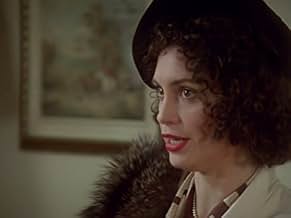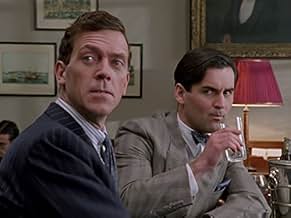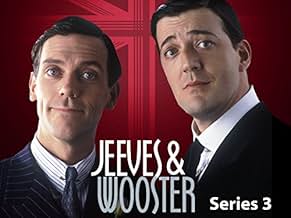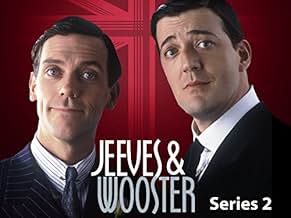Bertram Wooster, un profane bien intentionné et riche, a l'habitude de se donner des ennuis et c'est à son brillant valet, Jeeves, de le faire sortir.Bertram Wooster, un profane bien intentionné et riche, a l'habitude de se donner des ennuis et c'est à son brillant valet, Jeeves, de le faire sortir.Bertram Wooster, un profane bien intentionné et riche, a l'habitude de se donner des ennuis et c'est à son brillant valet, Jeeves, de le faire sortir.
- A remporté le prix 2 BAFTA Awards
- 2 victoires et 3 nominations au total
Parcourir les épisodes
Avis en vedette
I watched the show before reading the books, but I absolutely adore both. As others have said, the casting of the two main characters is perfect, though i wish Fry could've had more of a chance to show off.
There are a few notable differences between the two mediums, none of which hamper the viewer/reader's pleasure any. In the show, for instance, Jeeves seemed to be more warm-hearted than in the books, where he seemed to me to be more of an untouchable impressive figure, almost cruel at times to Bertie, though always pulling him out of trouble in the end. Fry's portrayal was preferable to the books' character, for me, because I enjoyed the more casual relationship. In the books, Jeeves was almost a father figure, not nearly so close.
One reason i enjoy the show so much is the way it ignores pressing world issues. The prohibition is in full swing over in America, but that is only referenced in one episode. The depression is about to hit, and the entire world is going to feel it, perhaps even Bertie. I've always found this fact to make my viewing all the more interesting, because Bertie and his friends take their wealth so casually. The books are written from Bertie's perspective, and as it's plausible that he would ignore socialism and other radical reform movements, economic disputes, prohibition, and other strife synonymous with the 20s, then so would the show. It's a wonderful departure from reality, into a world where your only worry is how to weasel out of unwanted engagements to less-than-admirable girls, or how to avoid your overbearing aunt.
It's all of these things that really put the Wodehouse stories and their subsequent television adaptations close to my heart, but it's the lovable characters and the flawless portrayal of them by each respective actor that keeps me drawn to watching this show over and over again.
There are a few notable differences between the two mediums, none of which hamper the viewer/reader's pleasure any. In the show, for instance, Jeeves seemed to be more warm-hearted than in the books, where he seemed to me to be more of an untouchable impressive figure, almost cruel at times to Bertie, though always pulling him out of trouble in the end. Fry's portrayal was preferable to the books' character, for me, because I enjoyed the more casual relationship. In the books, Jeeves was almost a father figure, not nearly so close.
One reason i enjoy the show so much is the way it ignores pressing world issues. The prohibition is in full swing over in America, but that is only referenced in one episode. The depression is about to hit, and the entire world is going to feel it, perhaps even Bertie. I've always found this fact to make my viewing all the more interesting, because Bertie and his friends take their wealth so casually. The books are written from Bertie's perspective, and as it's plausible that he would ignore socialism and other radical reform movements, economic disputes, prohibition, and other strife synonymous with the 20s, then so would the show. It's a wonderful departure from reality, into a world where your only worry is how to weasel out of unwanted engagements to less-than-admirable girls, or how to avoid your overbearing aunt.
It's all of these things that really put the Wodehouse stories and their subsequent television adaptations close to my heart, but it's the lovable characters and the flawless portrayal of them by each respective actor that keeps me drawn to watching this show over and over again.
Brilliant P.G.Wodehouse stories lose nothing from transfer to the screen. Of course, some series are better, some are worse, some are real masterpieces. In fact, I like all of them. Adaptation is really wonderful: amusing, dynamic, intelligent and sparkling with wit and humor. Leading actors are awesome. Hugh Laurie gives an unforgettable comic performance, masterfully imitating manners and way of speaking of typical young aristocratic idiot. Stephen Fry seems to be an unparalleled Jeeves. All series are well casted, though performers of several parts change. I especially like Elizabeth Morton as Madeline, Charlotte Attenborough as Stiffy and Richard Garnett as Gussie. The series entertain and cheer you up. As for me, I can't help laughing while watching them.
A wonderful and almost perfect rendition of a classic.
Some people (few people) scoff at this version for being too visual. In fact, they scoff at any visual version for trying to interpret what in essence are novels driven by wonderful narrative. However, the charm comes in the perspective as well as the aesthetic.
Yes it's a beautiful show. It uses locations perfectly and remains diligent to those halls as to their fictitious namesake. You eventually come to know these halls and manors yourself as Bertie once again is called out to Tottley.
The music is a beautiful pastiche of all things 20s. Incidental score, while fairly repetitive (you'll hear the same motifs and themes pop up regularly) just adds to the warm familiar atmosphere. It adds charm and period distinction. The actual songs in the show are fun as well and made for a wonderful soundtrack.
The acting as well is perfect. It characterises the pomp without anyone seeming awkward. The scripts flow and the pace always complements the stories. Fry and Laurie were born for this part and never once slip from character or wither in the spotlight.
But as I was saying, the beauty comes in perspective. Some people have grumbled that Laurie's "Wooster" is too much of a fool compared to the beautiful prose he's meant to have jotted in "his" books, yet I think it adds, as I said, perspective. We all write and dictate experiences from a personal perspective, what the show does is offer similar instances (and they are similar not exact in most cases) from a third party perspective. What we write in hindsight is rare to what objectively happened. This warm hearted Oxford gentlemen is educated, but not over gifted in the sense department. He writes and plays beautifully, but he's not quick and we see that demonstrated perfectly through Laurie.
Fry is masterful as Jeeves. Younger than what some would prefer, nevertheless you don't doubt his presence for a second.
The stories are a mix of accurate rendition and loose interpretation. The final fourth season especially has a couple of episodes which don't really feel quite on the ball as the rest, possibly because the divert too far from Wodehouse's material, nevertheless, the fourth season does sort of tie up the loose ends yet has a finale which keeps Jeeves And Wooster feeling as eternal on the TV screen as it does in book form.
A wonderful compliment to Wodehouse's masterful books. Miss at your peril.
Some people (few people) scoff at this version for being too visual. In fact, they scoff at any visual version for trying to interpret what in essence are novels driven by wonderful narrative. However, the charm comes in the perspective as well as the aesthetic.
Yes it's a beautiful show. It uses locations perfectly and remains diligent to those halls as to their fictitious namesake. You eventually come to know these halls and manors yourself as Bertie once again is called out to Tottley.
The music is a beautiful pastiche of all things 20s. Incidental score, while fairly repetitive (you'll hear the same motifs and themes pop up regularly) just adds to the warm familiar atmosphere. It adds charm and period distinction. The actual songs in the show are fun as well and made for a wonderful soundtrack.
The acting as well is perfect. It characterises the pomp without anyone seeming awkward. The scripts flow and the pace always complements the stories. Fry and Laurie were born for this part and never once slip from character or wither in the spotlight.
But as I was saying, the beauty comes in perspective. Some people have grumbled that Laurie's "Wooster" is too much of a fool compared to the beautiful prose he's meant to have jotted in "his" books, yet I think it adds, as I said, perspective. We all write and dictate experiences from a personal perspective, what the show does is offer similar instances (and they are similar not exact in most cases) from a third party perspective. What we write in hindsight is rare to what objectively happened. This warm hearted Oxford gentlemen is educated, but not over gifted in the sense department. He writes and plays beautifully, but he's not quick and we see that demonstrated perfectly through Laurie.
Fry is masterful as Jeeves. Younger than what some would prefer, nevertheless you don't doubt his presence for a second.
The stories are a mix of accurate rendition and loose interpretation. The final fourth season especially has a couple of episodes which don't really feel quite on the ball as the rest, possibly because the divert too far from Wodehouse's material, nevertheless, the fourth season does sort of tie up the loose ends yet has a finale which keeps Jeeves And Wooster feeling as eternal on the TV screen as it does in book form.
A wonderful compliment to Wodehouse's masterful books. Miss at your peril.
"Jeeves and Wooster" is one of the best pure adaptations I have ever seen in a television show. As a huge fan of the books, I have no problem with any characterizations or plot dramtizations. The best thing about this series is its Britishness. Both Jeeves and Wooster drip with satire. Each episode is laugh out loud funny. It is much better made than many British television offerings, such as the Peter Wimsey series (although I love it, too). I highly recommend a look at this series to anyone who has a British sense of humor or enjoys '20s glamor.
Any newcomers to the writing of P.G. Wodehouse should bear in mind the following points;
i) Wodehouse was a highly prodigious writer ii) All of his stories feature upper class idiots iii)There is always a happy ending iv) The plots are never plausible v) None of the first four points will prevent you from enjoying his work vi) Wodehouse is one of the greatest ever writers of English prose.
A surprising variety of humourists have been influenced by Wodehouse, including Peter Cook, John Cleese, Michael Palin, Ben Elton, Spike Milligan, Woody Allen and even Billy Connolly.
Television and film adaptations are rarely as good as the original book, but this production is about as good as it gets. Apart from Stephen Fry being rather too young at the time to play Jeeves, the casting is nearly perfect, particularly Hugh Laurie as Wooster.
There are time constraints on television programmes that books are not limited by. There is also the problem that Wodehouse was at his best in narrative passages rather than with dialogue. Nevertheless, this programme will still make you laugh out loud. Great music too.
Better still, read the books. Not just the Jeeves and Wooster titles, but also the Blandings series, Psmith, Mr. Mulliner and Ukridge books.
Whatever your taste in comedy, The Fast Show or Last Of The Summer Wine, Dad's Army or Monty Python, the chances are that PG Wodehouse will make you laugh.
'Jeeves and Wooster' still crops up on satellite and cable channels. It is well worth a look.
i) Wodehouse was a highly prodigious writer ii) All of his stories feature upper class idiots iii)There is always a happy ending iv) The plots are never plausible v) None of the first four points will prevent you from enjoying his work vi) Wodehouse is one of the greatest ever writers of English prose.
A surprising variety of humourists have been influenced by Wodehouse, including Peter Cook, John Cleese, Michael Palin, Ben Elton, Spike Milligan, Woody Allen and even Billy Connolly.
Television and film adaptations are rarely as good as the original book, but this production is about as good as it gets. Apart from Stephen Fry being rather too young at the time to play Jeeves, the casting is nearly perfect, particularly Hugh Laurie as Wooster.
There are time constraints on television programmes that books are not limited by. There is also the problem that Wodehouse was at his best in narrative passages rather than with dialogue. Nevertheless, this programme will still make you laugh out loud. Great music too.
Better still, read the books. Not just the Jeeves and Wooster titles, but also the Blandings series, Psmith, Mr. Mulliner and Ukridge books.
Whatever your taste in comedy, The Fast Show or Last Of The Summer Wine, Dad's Army or Monty Python, the chances are that PG Wodehouse will make you laugh.
'Jeeves and Wooster' still crops up on satellite and cable channels. It is well worth a look.
Le saviez-vous
- AnecdotesIn the television documentary Fry and Laurie Reunited (2010), upon reminiscing about their involvement in the series, it was revealed that Stephen Fry and Hugh Laurie were initially reluctant to play the part of Jeeves and Wooster, but decided to do so in the end, because they felt no one else would do the parts justice.
- ConnexionsEdited into Mickey belle gueule (1999)
Meilleurs choix
Connectez-vous pour évaluer et surveiller les recommandations personnalisées
- How many seasons does Jeeves and Wooster have?Propulsé par Alexa
Détails
- Date de sortie
- Pays d’origine
- Langue
- Aussi connu sous le nom de
- Дживс і Вустер
- Lieux de tournage
- Highclere Castle, Highclere, Hampshire, Angleterre, Royaume-Uni(Totleigh Towers)
- sociétés de production
- Consultez plus de crédits d'entreprise sur IMDbPro
Contribuer à cette page
Suggérer une modification ou ajouter du contenu manquant

Lacune principale
By what name was Jeeves and Wooster (1990) officially released in India in English?
Répondre



































